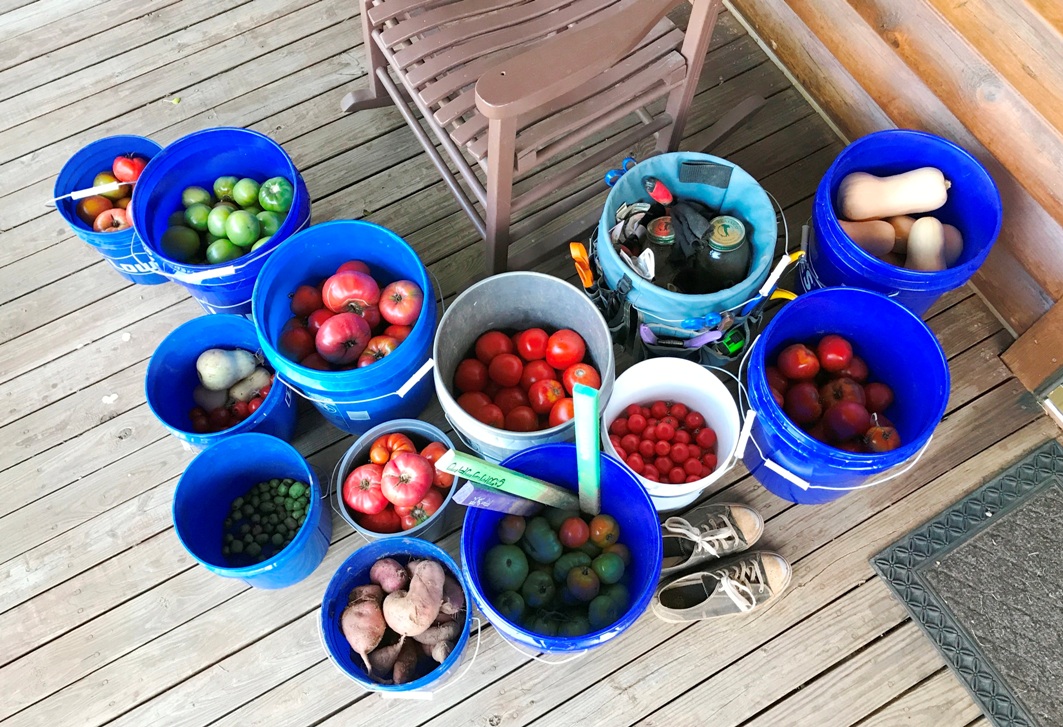Of Harvests and Hurricanes
By
Cognitive Dissonance
Aside from the planting and harvesting of various fall crops, Harvest 2017 is done and in the can…or at least in the canning jar. As projected more than a week ago, with hurricane Irma threatening to roar up the middle of Virginia we felt it prudent to finish the harvest a bit early and remove the threat to our food source. Better safe than sorry is how we try to approach life these days. The road to greater self sufficiency is paved with conservative notions and practices.
This, by the way, is NOT a political statement, but just a way of life.
Truth be told, from a purely economic point of view it isn’t cheap to can your own food. At least not the way we do it. Mrs. Cog is a big proponent of ready-to-eat meals in a jar. This entails pressure canning various stews, soups and sauces, almost always containing meat, for convenient future use. The result is no shortage of vegetables, potatoes, meat and other goodies packed into these compact meals. Pound for pound, nothing on the supermarket shelf compares to our pantry in quantity or quality.
But all this goodness does come at a price, one paid out of the pocket book and the time book, both of which are in short supply these days. Basically you pay the piper now or later, but payment is always due upon demand. Putting food away for future use is payment in advance at the present day discount rate. More than likely, a jar of delicious stew eaten three years from now will contain more monetary value than that same jar of stew today.
That’s a basic economic calculation proven beneficial for thousands of years. Anything not consumed today should be squirreled away for tomorrow. Just because today is plentiful does not mean tomorrow will be as well. The basic practice of thrift and deferred gratification is completely lost upon today’s consumer culture. But the piper always demands payment on the barrel head. And pay we will, in some form or function.
………………
There are some who are beginning to bemoan the fact hurricane Irma did not live up to the hype. This is a lose/lose situation because if the hurricane did create the level of destruction some had projected as possible, many more lives would have been lost and the dollar value would have been in the hundreds of billions of dollars rather than just half (or more) of a hundred billion.
But even worse is the feeling many will walk away with of having dodged a bullet, followed quickly by “That wasn’t so bad”. Setting aside that many homes and lives have been severely disrupted, which will never make the evening news, a risk avoided is often a risk foolishly diminished or dismissed.
As a former financial planner and stock broker I constantly considered and contemplated ‘risk’ when interacting with my clients and their finances. Frustratingly, the one constant I always dealt with when talking to clients was their complete misunderstanding and non comprehension of what ‘risk’ actually is.
For average Jane and Joe, risk is like a light switch, either on or off. Meaning either they have experienced the effects of realized risk or they have not. The immediate example is the ‘not as bad as expected’ hurricane Irma. While there is little doubt the mainstream media hyped the storm to no end, their hype played no part in the actual ‘risk’ of a Cat 5 hurricane devastating Miami before gutting Florida from stem to stern.
If Irma had not clipped the northern coast of Cuba (which was destroyed) but instead had remained 20-30 miles further north off shore, all the projections of massive destruction in Florida could easily have materialized. Though I suspect those who live on the Florida Keys or Marco Island might want to have a discussion about dodging a bullet because they most certainly did not. When you are up to your chin in flood waters, any debate about the difference between a Cat 4 and a Cat 5 hurricane quickly becomes moot.
Risk is not fixed, but instead is always morphing and adapting to the chaotic world we live in. Unfortunately we silly humans are desperate to quantify and qualify risk in order to remain safely confined within our illusionary cocoon. Therefore we ignore what we can and rationalize away what we can’t ignore.
Normally this is a recipe to quick annihilation, for Mother Nature does not suffer fools well. Unfortunately in a world of massive central bank printing of unlimited (and ultimately worthless) fiat, along with the financialization of everything nailed down (including the debt used to buy everything nailed down) the powers that be have been able to effectively hide ‘risk’ from view.
This will not last simply because it cannot last. That which is not sustainable will not be sustained. But it can be prolonged by consuming everything produced today plus everything that will be produced in the near future with little to no regard for sustainability. At some point the car runs out of gas and people suddenly discover how much effort it actually takes to push a two ton SUV down the road a mile or so.
Thus we grow our garden during the summer and eat from it during the winter. And always put away reserves for those lean years when the harvest is less, or different, than expected…like it was this year. Farmers have always understood this concept, though with the commoditization and financialization of the food ‘industry’, they too are falling prey to poor farming and financial practices.
Risk cannot be eliminated, at least not for long. But it can be mitigated with sober analysis and practical planning. But where’s the fun in that when everyone else around you is feeding at the unlimited buffet?
09/11/2017
Cognitive Dissonance
P.S. I was going to post an article today regarding the 16th anniversary of 9/11. That article is still in production and is probably a week away. Good things come to those who are patient.
The last of the 2017 summer harvest. If you think those things you purchase in the supermarket are 'tomatoes', you actually haven't had a tomato.



I don’t have enough imagination to figure out how government (and personal) debt will be repaid. I do not think it can be, and I lack the imagination to determine who will be paid and who will not. After the auto industry bankruptcies, I see that logic does not prevail; politics does.
We have a population, and I include myself, addicted to the level of governmental spending we now have. My road is nicely paved, my kids go to a “free” public school (ever hear of “fee day”?), crime is pretty low in my area, the library was recently renovated, and the air is reasonably clean to breath (except for the pine pollen season in the spring). Order is maintained so that one can go about engaging in business. My parents enjoy social security payments and Medicare, which keeps me from worrying about them the way I would if they did not have these things. I do not get the benefit of food stamps, daycare subsidies, housing assistance, a free cell phone, health insurance tax credits, etc., but I do benefit from government spending in ways I mentioned above, and I’m sure I missed many other ways I benefit from government spending. My family pays what seems to me to be a lot in taxes so that I have these things, and that others get these things and some get more.
To begin paying off debt, spending cannot exceed expenses. What government benefits are cut? Will it be cut out of the things I am using, or someone else’s goodies? We are addicted to our goodies and do not want to give them up. Next we must actually pay down the debt. That will require even less government spending. More goodies will need cutting. I, like everyone else, still want mine, and if I have to sacrifice, I expect everyone else to along with me. We can try tax cuts to stimulate the economy so more money comes in as taxes as the economy grows. I’m all in favor of that, but I fear the debt hole is far too deep to dig out of.
We do not seem to be able to even get a tax cut passed in Congress to try this method, which I believe will work to an extent. Government spending must be cut, and how that looks is what I cannot imagine. Do we start with means-testing for social security and Medicare in order to determine eligibility? That would make it true, outright welfare.
Do we cut food stamp spending or make it harder to qualify? I can see riots if successful but no politician willing to take that on since they would have to take goodies from their constituents who would then vote them out of office in order to get someone in who will restore the goodies. Their political donations would bottom out with grocery store and junk food lobbyist funding whoever promises the goodies instead of them.
I see no answer to the process above because politicians have no spine, and people will just replace them with politicians who promise goodies if they do find a spine. I think it will be easier to continue on our path, borrowing to afford what we are now getting, and printing money when no one will lend to us until money has no meaning.
I’ve written for too long and have arrived nowhere. I’m done.
Oh, you definitely arrived somewhere. Unfortunately it is right back where you started. Not your fault since the system is not designed to actually work in a sustainable manner, at least not any longer.
The debt will never be paid off nor will it be defaulted on. At least not in the traditional manner, where the person who lent the money is told they won’t be paid. When a government has a ‘money’ printing press, there will never be a default because they can simply print the money needed to pay the bills.
The results of this insanity is inflation. And when they really get the printing presses running at top speed (they no longer print very much physical cash, but instead use a computer to ‘create’ more electronic ‘money’) inflation will be very high and will get exponentially worse.
There is a point when the entire system collapses simply because no one has any faith and belief in the nearly worthless dollar bills in their pocket. But we are some ways away from that point. But when it arrives, it will feel like it happened overnight. Because it did happen overnight. Faith and belief is slowly gained and quickly lost.
Cognitive Dissonance